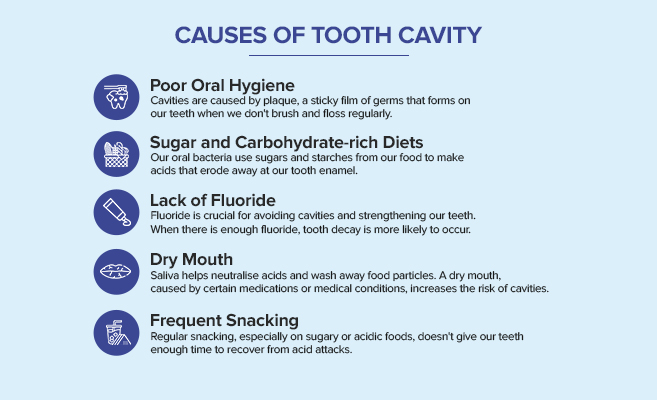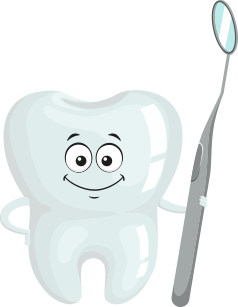Tooth Cavity: Symptoms, Causes, and Treatments
Have you ever experienced sudden toothaches or sensitivity while eating your favorite treats? Wondered what could be causing those tiny holes in your teeth?
We all love our smiles, but sometimes an unwelcome guest can show up in our mouths – a tooth cavity! It’s important to understand what a tooth cavity is, how it can affect us, and what we can do about it.
So if you are curious to know about cavity symptoms, causes, and treatments, you arrived at the right place. In this blog, we’ll break down everything you need to know about tooth cavities in easy language, including the best teeth cavity treatment options available.
What is a Tooth Cavity?
A tooth cavity is a tiny hole that develops in the tooth’s outer, hard layer. It is also referred to as dental caries or tooth decay. It occurs when acids created by bacteria in our mouths erode the enamel, the tooth’s outermost layer of protection. Cavities can worsen if not treated, resulting in pain, infection, and even tooth loss.
Causes of Tooth Cavity
Various factors can cause tooth cavities. Some of the main causes of tooth cavities are as follows:

- Poor Oral Hygiene: Cavities are caused by plaque, a sticky film of germs that forms on our teeth when we don’t brush and floss regularly.
- Sugar and Carbohydrate-rich Diets: Our oral bacteria use sugars and starches from our food to make acids that erode away at our tooth enamel.
- Lack of Fluoride: Fluoride is crucial for avoiding cavities and strengthening our teeth. When there is enough fluoride, tooth decay is more likely to occur.
- Dry Mouth: Saliva helps neutralize acids and wash away food particles. A dry mouth, caused by certain medications or medical conditions, increases the risk of cavities.
- Frequent Snacking: Regular snacking, especially on sugary or acidic foods, doesn’t give our teeth enough time to recover from acid attacks.
Tooth Cavity Symptoms
Detecting a cavity early can prevent further damage. Look out for these common tooth cavity symptoms that you may notice:
- Tooth Sensitivity: You may experience discomfort or pain when consuming hot, cold, or sweet foods and drinks.
- Toothache: Persistent or occasional toothaches can indicate a cavity, especially when biting down.
- Visible Holes or Pits: You might notice small holes or pits on the surface of your teeth, especially in the affected area.
- White Spots: Early cavities can appear as white spots on your teeth, indicating enamel erosion.
If you are experiencing these tooth cavity symptoms, visiting the best dental clinic in Chennai can help you detect your problem early.
Cavity on Front Tooth
While cavities are often associated with back teeth (molars), they can occur on front teeth too. Cavities on the front teeth might be more noticeable, and the symptoms can affect your smile and confidence. Don’t delay a visit to the dental clinic in Chennai if you suspect a cavity on your front tooth.
Tooth Cavity Treatment
The good news is that cavities can be treated, especially if caught early. The various tooth cavity treatment options include:
- Fillings: Dentists in Chennai use fillings to repair small to medium-sized cavities. They remove the decayed portion of the tooth and fill the space with materials like composite resin, porcelain, or amalgam.
- Crowns: A dental crown might be necessary for larger cavities that have damaged a significant portion of the tooth. A crown is a cap that covers and protects the remaining tooth.
- Root Canal: A root canal procedure might be required if the decay has reached the tooth’s pulp (where the nerves and blood vessels are). It involves removing the infected pulp and sealing the tooth.
- Extraction: When a tooth has suffered significant harm and cannot be recovered, extraction may be the only option left.
Preventing Tooth Cavities
For cavities, prevention is the best form of treatment. Here are some tips to prevent dental caries:
- Brush and Floss: Brush your teeth at least twice a day and floss daily to remove plaque and food particles.
- Limit Sugary and Acidic Foods: Cut down on sugary and acidic foods and drinks. If you do indulge, rinse your mouth with water afterward.
- Use Fluoride: Use fluoride toothpaste and consider using fluoride mouthwash as directed by your dentist.
- Regular Dental Check-ups: Visit your dentist for regular check-ups and cleanings to catch any issues early on.
Remember, a healthy smile starts with good oral hygiene and regular dental care. Take care of your teeth, and they’ll take care of you!
Conclusion
Tooth cavities can be a real pain, but armed with knowledge about their causes, symptoms, and treatments, you can take steps to prevent and address them effectively.
Remember that preventing cavities requires practicing good dental hygiene. Regular dental check-ups, regular brushing and flossing, and avoiding foods high in sugar and acid are all recommended. Early cavity detection can save you from more complex procedures and maintain your gorgeous smile.
If you suspect you have a cavity or experience any tooth pain or sensitivity, don’t hesitate to seek professional dental care at Radiant Dental. We have the expert team of the best dentist in Chennai who have the expertise to diagnose and offer teeth cavity treatment, ensuring your oral health remains in top shape.
So, keep those pearly whites healthy and shining bright by giving your teeth the care and attention they deserve. Your smile will thank you for it!
FAQs
Q 1: What are the common symptoms of a tooth cavity?
Answer: A toothache, sensitivity to hot or cold meals, obvious holes or pits in teeth, and black stains on the enamel are all common symptoms of dental decay.
Q 2: What causes tooth cavities to form?
Answer: The combination of bacteria, carbohydrates, and plaque on the teeth results in the creation of acids that erode the enamel, which is the main cause of tooth cavities.
Q 3: Can tooth cavities heal on their own without treatment?
Answer: Unfortunately, dental cavities cannot cure on their own. Early detection and prompt dental care are crucial to stop further damage and probable tooth loss.
Q 4: What are the common treatments for tooth cavities?
Answer: In order to regain the tooth’s function and look, dentists often remove the decayed section of the tooth before filling the cavity with porcelain, composite resin, or amalgam.
Q 5: What should I do if I suspect a molar tooth cavity?
Answer: You must see your dentist immediately if you think you have a cavity in a molar tooth. The molars are important for chewing, and cavities in these big back teeth can cause a lot of pain.

 +91 9513446186
+91 9513446186
